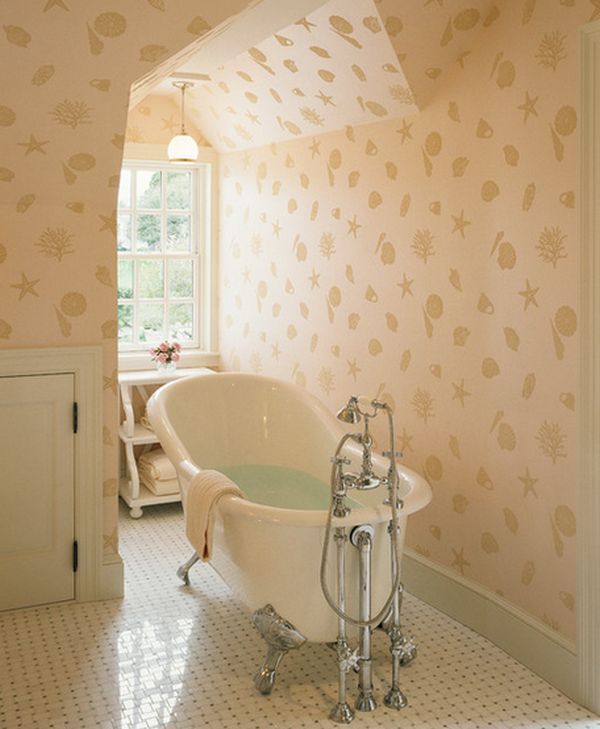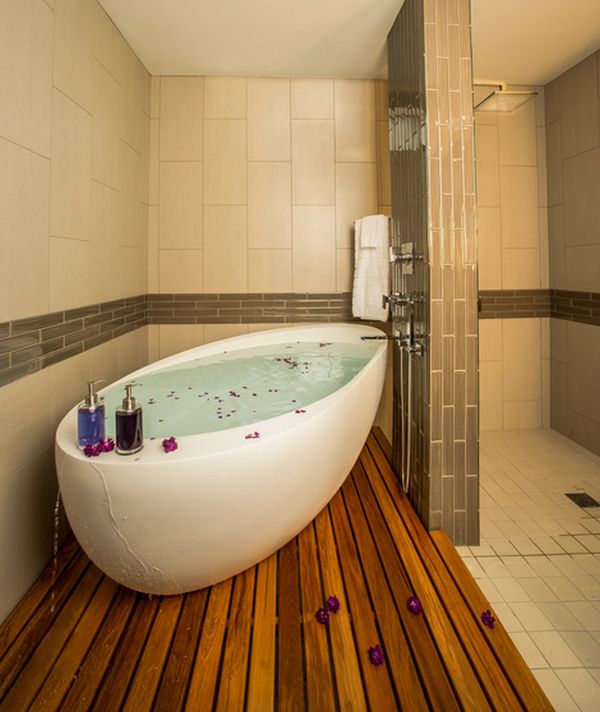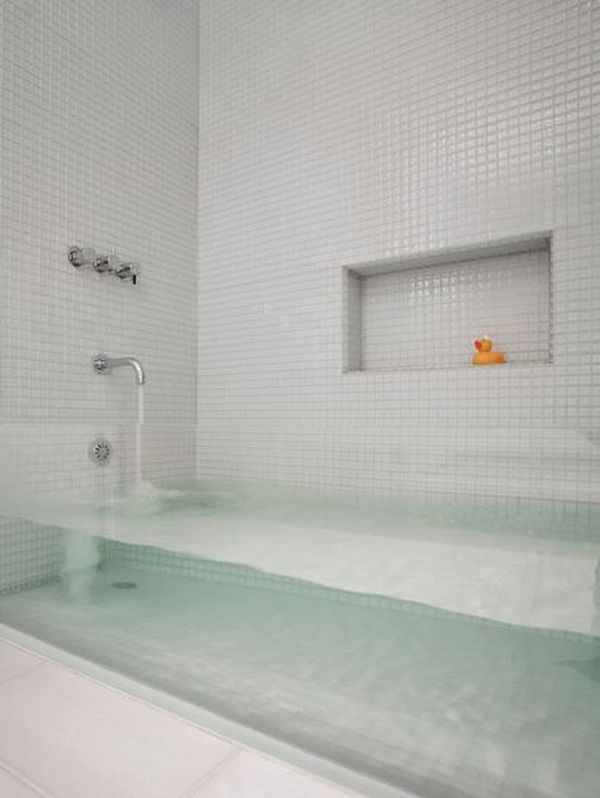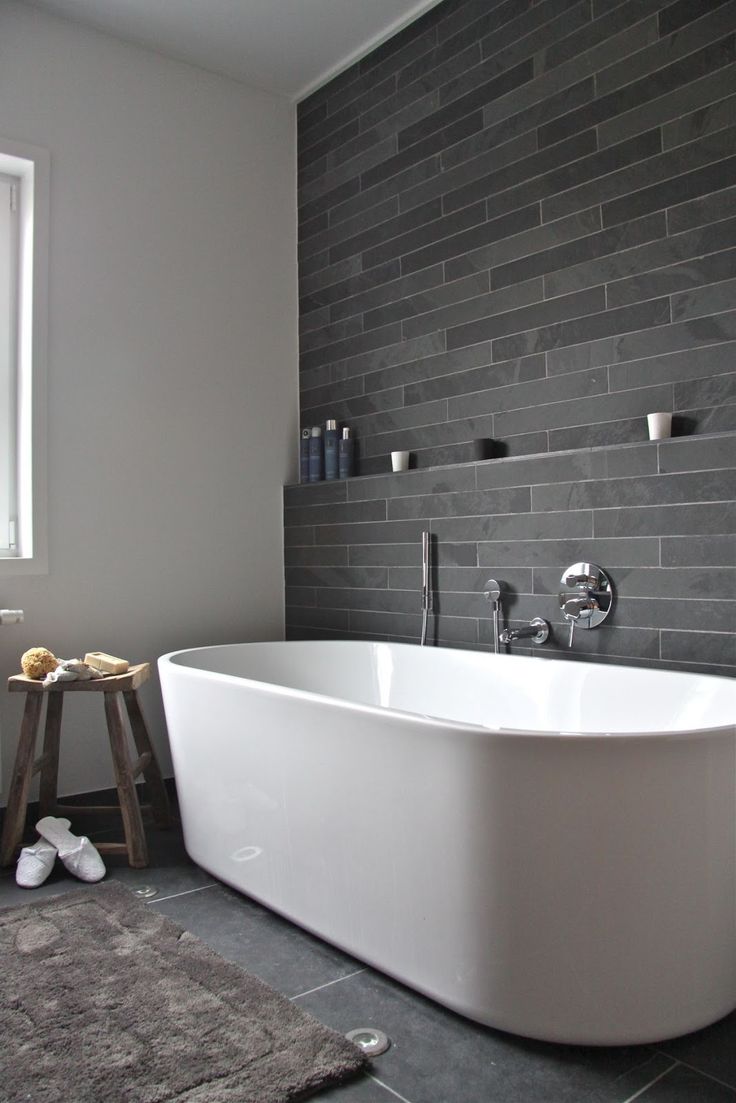Read article : Which is Right for You?

Bathroom fixtures have come a long way over the past few decades. Specifically, bathtubs have gone from being a purely functional fixture to having the capacity to be the focal point of a bathroom. In fact, there are so many options – beautiful, stylish, and practical options – out there that it can be hard to choose what bathtub is right for you. Do you love the exposed curves of a freestanding tub? Would you prefer the space-saving design of a built-in?
 View in gallery
View in gallery
Before you make your decision, we’d recommend you read this article, where we compare freestanding tubs and built-in tubs in a variety of categories. You’ll not only get inspiration from some gorgeous photos, but you’ll also gain some insight about which tub might ultimately be the right fit for you and your bathroom space. Enjoy!
DEFINITIONS:
 View in gallery
View in gallery
Freestanding (or Free Standing) Tub – A freestanding tub is a bathtub that is finished on all sides and is able to stand alone. Often, freestanding tubs are more like furniture than an actual bathroom fixture, although they function in the same way as built-in tubs.
 View in gallery
View in gallery
Built In (and Drop In) Tub – A built in tub (including the drop-in style) is a bathtub that is unfinished on at least two sides (but finished on the top edge) and must be installed against a wall or within a pre-built tub surround or enclosure. As evidenced by their name, this type of bathtub is architecturally inherent in the bathroom design.
SIDE BY SIDE COMPARISONS OF FREESTANDING VS. BUILT-IN TUBS:
 View in gallery
View in gallery
Cost – This one depends entirely upon the bathtub design and the tub and faucet materials chosen. Freestanding tubs have, in the past, been more of a high-ticket item, but more recently they have become much more affordable.
 View in gallery
View in gallery
The surround for a built-in tub can be expensive and certainly add to the overall cost of the fixture, whereas the freestanding tub requires no additional surround.
 View in gallery
View in gallery
Plumbing can be more expensive for freestanding tubs, however, because the plumbing might move and is harder to “hide” than the plumbing for built-ins.{found on fraleycompany}.
 View in gallery
View in gallery
Spatial Efficiency – For the most part, this one goes to the built-ins. Freestanding tubs simply take up more space than built-ins, due to the space required around the tub itself and the faucet constraints. (Floor-mount faucets tend to take up more space than wall- or deck-mounted faucets.){found on architecturaldigest}.
 View in gallery
View in gallery
Capacity for Shower/Tub Combo – In general, built-ins take this category, although freestanding tubs have been known to pull off the shower/tub combo just as well. Built-in tubs, however, are often (and can be easily) combined with a wall-mounted shower fixture, and it’s hard to argue with two fixtures for the real estate of one.
 View in gallery
View in gallery
 View in gallery
View in gallery
Flexibility in Placement – Freestanding tubs win this, hands-down. Because of their all-sided finish, freestanding tubs can be placed anywhere – even in the center of the bathroom, if so desired. Built-in tubs are constrained to bathroom corners or alcoves.
 View in gallery
View in gallery
Bathtub Tray Potential – This one is a draw. Both bathtub styles have finished top edges, so as long as there is enough of an edge to balance and support a bathtub tray, this fine accessory will work in either case.
 View in gallery
View in gallery
Decorative Impact – This one might be arguable, depending on one’s personal aesthetic, but freestanding tubs win by nature of their inherent capacity to make a very strong – almost sculptural – visual statement.
 View in gallery
View in gallery
Standing alone, not one aspect of the freestanding tub “blends in” with the rest of the bathroom, which easily makes them the focal point of the entire bath space.
 View in gallery
View in gallery
Storage Accessibility – Because a freestanding tub appears its best when given space to “breathe,” a bather’s access to storage within arm’s reach is typically compromised. Of course, this can be remedied with the use of bathtub trays and other creative means. But, in general, built-in bathtubs take this category.{found on designingontheside}.
 View in gallery
View in gallery
Installation Constraints – Freestanding tubs can be very heavy (think cast iron), which may require reinforced flooring. (It should be noted, however, that several lighter-weight options are available as well, including fiberglass, which is also the least expensive and easiest to install option.)
 View in gallery
View in gallery
Plumbing placement may also be an issue, if you’re trying to retrofit a freestanding tub into a space where there hasn’t been one before.
 View in gallery
View in gallery
For these reasons, although built-ins come with their own installation and construction constraints, we’re going to say built-ins are generally an “easier” install…by a slim margin
 View in gallery
View in gallery
Alternative Accessibility – Built-in bathtubs can be designed to be walk-in bathtubs, which is an important feature for elderly or disabled bathers.
 View in gallery
View in gallery
Style Factor – This is a draw, depending on what look you’re after. Built-in bathtubs can be designed with any type and style of materials, which means they can be customized to blend in with or stand out from the rest of the bathroom design. Freestanding tubs, though, are available in a variety of sizes, shapes, and styles (think vintage clawfoot or streamlined modern design), making them high on the style factor scale as well.
 View in gallery
View in gallery
 View in gallery
View in gallery
Vintage Vibe – Freestanding tubs, of course. Does anything feel more luxuriously vintage than a clawfoot tub?
 View in gallery
View in gallery
Modern Aesthetic – Freestanding tubs win by a margin here. Because they’re now available in so many styles and shapes, the visual appeal of an organic modern freestanding tub is hard to beat with even the most contemporary built-in design.
 View in gallery
View in gallery
Spa Feel – This one’s a toss-up. Freestanding tubs provide immediate presence to a bathroom and have give off a special, pampering vibe. They’re called “soaking tubs” for a reason. But built-ins can be luxurious in their surround, fully equipped with candles and loofahs and whatever a bathing heart might desire. Heads or tails.
 View in gallery
View in gallery
WEIGH IN.
What style of bathtub do you prefer – freestanding or built-in? Do you think one wins for aesthetics and the other for function?



































